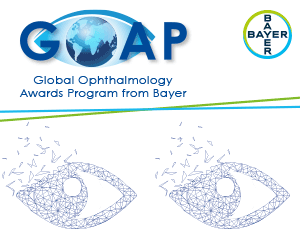Global Ophthalmology Awards Program

Time is running out to submit your Letter of Intent for the Global Ophthalmology Awards Program – a unique initiative established by Bayer in 2012 to support research projects that advance scientific understanding of retinal diseases. The deadline for submission is 31 January 2020. We have included some advice and top tips you may wish to consider in developing your submission. Please share with your colleagues.
Advice from the alumni:
- Identify an original project that will have high clinical impact and make a difference to patients
- Set clear, realistic goals that are achievable in 1 year
- Ask your colleagues to review your application
for scientific content
and plausibility - Don’t be afraid to challenge conclusions from previous research
- Gather as much pilot data as possible
- Remain focused and dedicated to process
5 top tips for your submission:
- State a clear hypothesis upfront. State if the hypothesis will be tested and what you will be doing in terms of research and the clinical program. Explain how this activity will improve your skills and abilities when treating patients with retinal diseases
- Acknowledge competing hypotheses, funding opportunities and time constraints. What are the pitfalls of the approaches proposed?
- Ask for the realistic amount of money you need to do the work. Make sure your budget corresponds to the activities you propose
- If this is your first opportunity as an independent investigator, consider proposing a good, small project in the first instance
- Remember to notify your institute’s administrators that you are making an application well before the application is due to prevent delays
The GOAP Website includes a wealth of information to help you with your submission. If you have additional queries, the organizers can be contacted at goap@bayer.com and they will be delighted to help.
We hope that you will be able to take this exciting opportunity to support research initiatives ultimately seeking to improve treatment outcomes and patient quality of life through effective management of retinal diseases.
